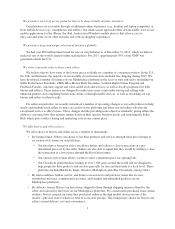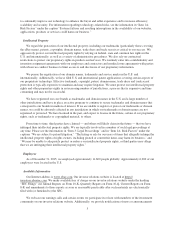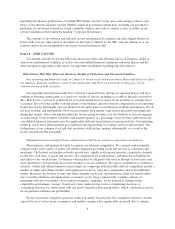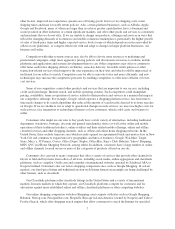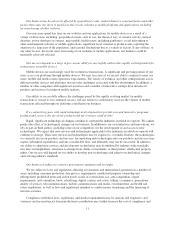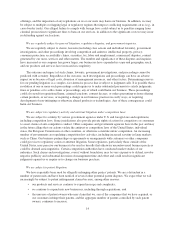eBay 2015 Annual Report Download - page 22
Download and view the complete annual report
Please find page 22 of the 2015 eBay annual report below. You can navigate through the pages in the report by either clicking on the pages listed below, or by using the keyword search tool below to find specific information within the annual report.• credit risk and higher levels of payment fraud;
• profit repatriation restrictions, foreign currency exchange restrictions or extreme fluctuations in foreign
currency exchange rates for a particular currency;
• political or social unrest, economic instability, repression, or human rights issues;
• geopolitical events, including natural disasters, public health issues, acts of war, and terrorism;
• import or export regulations;
• compliance with U.S. laws such as the Foreign Corrupt Practices Act, and foreign laws prohibiting
corrupt payments to government officials, as well as U.S. and foreign laws designed to combat money
laundering and the financing of terrorist activities;
• antitrust and competition regulations;
• potentially adverse tax developments and consequences;
• economic uncertainties relating to sovereign and other debt;
• different, uncertain, or more stringent user protection, data protection, privacy, and other laws;
• risks related to other government regulation or required compliance with local laws;
• national or regional differences in macroeconomic growth rates;
• local licensing and reporting obligations; and
• increased difficulties in collecting accounts receivable.
Violations of the complex foreign and U.S. laws and regulations that apply to our international operations
may result in fines, criminal actions, or sanctions against us, our officers, or our employees; prohibitions on the
conduct of our business; and damage to our reputation. Although we have implemented policies and procedures
designed to promote compliance with these laws, there can be no assurance that our employees, contractors, or
agents will not violate our policies. These risks inherent in our international operations and expansion increase
our costs of doing business internationally and could harm our business.
Any factors that reduce cross-border trade or make such trade more difficult could harm our business.
Cross-border trade is an important source of both revenue and profits for us. Cross-border trade also
represents our primary (or in some cases, only) presence in certain important markets, such as Brazil/Latin
America, China, and various other countries. In addition, our cross-border trade is also subject to, and may be
impacted by, foreign exchange rate fluctuations.
The interpretation and application of specific national or regional laws, such as those related to intellectual
property rights of authentic products, selective distribution networks, and sellers in other countries listing items
on the Internet, and the potential interpretation and application of laws of multiple jurisdictions (e.g., the
jurisdiction of the buyer, the seller, and/or the location of the item being sold) are often extremely complicated in
the context of cross-border trade. The interpretation and/or application of such laws could impose restrictions on,
or increase the costs of, purchasing, selling, shipping, or returning goods across national borders.
The shipping of goods across national borders is often more expensive and complicated than domestic
shipping. Customs and duty procedures and reviews, including duty-free thresholds in various key markets, the
interaction of national postal systems, and security related governmental processes at international borders, may
increase costs, discourage cross-border purchases, delay transit and create shipping uncertainties. Any factors
that increase the costs of cross-border trade or restrict, delay, or make cross-border trade more difficult or
impractical would lower our revenues and profits and could harm our business.
10





